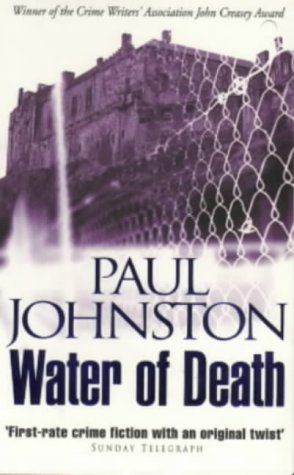Paul Johnston devised and wrote a krimi series set in a near-future Edinburgh, after the United Kingdom disintegrated into warring city-states following a singular concatenation of disasters, fiscal, climatic, and social. They ran out of money, the drugs and their lords took over, and climate change came with a vengeance. Ripped from today’s headlines, the cliché-writing publicist would say.

Not quite, because Johnston added a delightful twist. The independent, impoverished people of Edinburgh turned to the ages for salvation. Huh?
They established a Platonic society, ruled by philosopher-monarchs whose directives are executed by guardians, who in turn are aided by auxiliaries. There on the rock, in Edinburgh Castle, the philosophers meet and decree.

In the first generation they were idealists suckled on the book, ‘The Republic,’ but as new members joined and founders died, pragmatism became the order of the day. The reality combines Platonic forms with KGB surveillance.
The books are, however, not expositions of Plato, nor critiques, but rather krimis. The exposition comes out as parts of it are relevant to the narrative at hand.
The protagonist is Quintiliian Dalrymple, a demoted auxiliary, who is called in when needed as an investigator since he combines the training of an auxiliary with the freedom of a citizen, i.e., he does not wear a uniform that frightens other citizens. He has been needed eight times. I have read them all, and this is the last in my reading though not chronologically last. I missed it earlier. Demoted? Read on.
Edinburgh ekes out a living by selling gambling, drugs, alcohol, and prostitution to wealthy visiting Arabs and Asians. They seem to love those red heads. These treats are denied the locals but dished up to the the foreigners who come and pay.
Of course, no Scot can be denied whiskey so they have their version, but not the good stuff reserved for those who pay with hard currency rather than with worthless philosophical scrip. Yes, of course, there is black market. Among the Edinburghers sex is done on a rota as though physical exercise. The men and women live in barracks’s and have barracks names and numbers, not names. There is neither privacy nor intimacy. All of this is to reduce egotism, the intrusion of private family, and so on…..
Then some fiend puts poison in a tourist whisky bottle, which is stolen and drunk by a citizen, or so it seems. That is bad enough for morale, but if a tourist dies, Edinburgh will, too. When all else fails, Quint is called in to prevent such a catastrophe.
The unique set-up is spoiled by Quint’s constant churlishness, I am afraid. He has to make a smart-ass comment every time, on everything, and to everyone. Where does he get the energy from on the 2000 calories-a-day diet? His auditors in turn have to frown and scold him each time. He is adolescent in his desire to shock and offend as though he were a schoolboy. If this by-play, let us call it that, were cut from this title, it would reduce the book a lot. Really, Quint. Grow up! Quint also spends a lot of the reader’s time worrying about his sex life. That can be diverting in some writers but here it is a mantra repeated for its own sake, again, and again, to pad out the pages.
There is no compensation in the plot, which veers from one pillar to another post without much rhyme or reason, except insofar as it allows Quint to fire off more from his endless supply of bon(ring) mots.
The labor in maintaining a series must be very difficult and it shows in this book, where everything is laboured, laboured again, and then laboured once more anew. That it is a hot summer is said a hundred times. if it is said once. Got it.
The larger point is that Enlightenment (that is how the regime characterises itself) Edinburgh is as destitute as say Seoul in 1949. Point taken, but I doubt that anyone living in those dire circumstances spends as much time as Quint does whining about it. It takes all their time and energy to struggle on in such poverty. Somehow Quint has the luxury to take the time and energy constantly to complain, carp, and criticise. That it the writer’s conceit.

I see that there is another one out this year. Maybe, maybe not.
Skip to content
